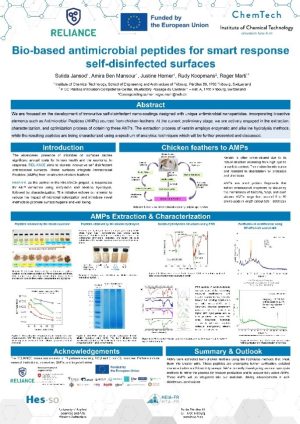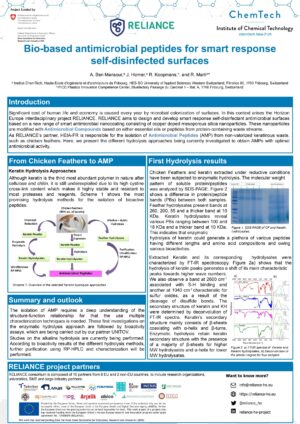RELIANCE poster presentation at the Third-Year Meeting of the MUR Excellence Program 2023–27, X-CHEM – Expanding Chemistry, Italy
A poster titled “Functionalized materials with essential oils for eco-friendly antimicrobial nanocoatings” showcased RELIANCE results at the Third-Year Meeting of the Italian Ministry of University and Research (MUR) Excellence Program 2023–27, X-CHEM – Expanding Chemistry in Italy, taking place on 18 December 2025.
The poster was developed by RELIANCE partners from the University of Rome Tor Vergata and presented by Elisa Recchia.
She shared results regarding the work on next-generation antimicrobial coatings based on mesoporous silica nanoparticles (MSNs), which highlighted the superior broad-spectrum efficacy of the non-calcined copper-modified MSNs (Cu-MSN-1), outlining their strong potential for future antimicrobial surface technologies.
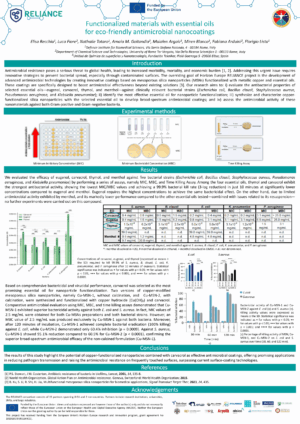
RELIANCE poster presentation at the 1st Swiss Sustainable Polymer Conference (SSPC), Switzerland
A poster titled “(Bio)Polymers at ChemTech” showcased RELIANCE results at the 1st Swiss Sustainable Polymer Conference (SSPC) in Switzerland, taking place on 23 May 2025.
The poster was developed by RELIANCE partners from the School of Engineering and Architecture (HEIA-FR), and presented by Prof. Roger Marti.
He shared results regarding the ambitious work in developing bio-based, circular-by-design polymers, regarding (Bio)Polymers, including Polyester Amides – Biobased, biodegradable, Tuneable, PEA Applications, Sugar-based Plastic Platform and Keratin.
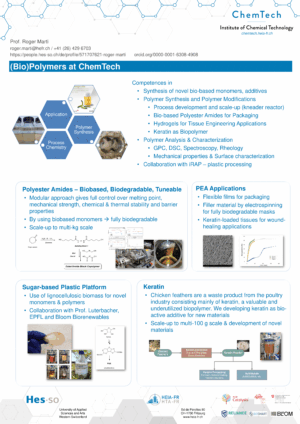
RELIANCE poster presentation at the Biosensors 2025, LISBON, PORTUGAL
A poster titled “Electrochemical paper-based device for the detection of SARS-CoV-2 on the surface” presented RELIANCE project at the 35th edition of the Biosensors Congress 2025 in Lisbon, Portugal, from 19 to 22 May 2025.
The poster was developed by RELIANCE partners from the Defence Institute for Medical Biosciences, and the University of Rome “Tor Vergata”,
Department of Chemical Science and Technologies, Rome, Italy.
The poster demonstrates the importance of paper-based immunosensors for detecting viruses on surfaces. It showcases the method applied by UNITOV that utilizes magnetic beads as a support for the sandwich-type immunological chain, which, due to its high surface/volume ratio, enables the loading of a high number of antibodies, thereby improving sensitivity. For electrochemical measurements, they functionalised the working electrode by drop-casting with carbon black, demonstrating improved sensitivity using this affordable nanomaterial.
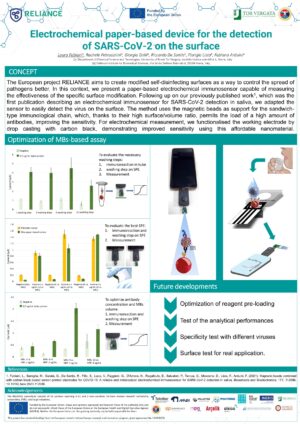
RELIANCE poster presentation at the Bioanalytics Days in Rome, Italy
A poster titled “Origami paper-based biosensor to SARS CoV-2 on the surface” presented advances with RELIANCE project results at the Bioanalytics Days in Rome, Italy, held 7 – 9 April 2025.
The poster was developed by RELIANCE partners from the Department of Chemical Science and Technologies, University of Rome Tor Vergata (UNITOV) and Defence Institute for Biomedical Sciences (ISBD).
The poster displays an adaptation of the paper origami electrochemical sensor developed within the project to easily detect the SARS-CoV-2 virus on a surface. The method uses the magnetic beads as support for the sandwich-type immunological chain, which, thanks to their high surface/volume ratio, permits the load of a high amount of antibodies, improving the assay sensitivity.

RELIANCE poster presentation at FTAL Conference On Circular Economy, Switzerland
A poster titled “Valorizing Agro-Industrial Waste: Exploring Antimicrobial Peptides Prepared from Feather Keratin” presented RELIANCE project at the FTAL conference held 14 - 15 November 2024 at Campus Est, Lugano-Viganello, Switzerland.
The poster is authored by RELIANCE partners from the University of Applied Sciences Western Switzerland (HES-SO), Haute Ecole d’Ingénierie et d’Architecture de Fribourg (HEIA-FR) Justine Horner, Amira Ben Mansour, Sutida Jansod, Claire Gay and Roger Marti.
The poster displays progress in keratin peptide extraction and purification strategies, employed to generate a wide range of AMP candidates with optimal bioactivity.

On the non-canonical structure of peptide derivatives of keratin (KAMPs) through molecular simulations
Panagiotis Panagopoulos Papageorgiou1, Katerina S. Karadima1,2, Ioanna Papageorgiou1,Vlasis G. Mavrantzas1,2,3,*
1Department of Chemical Engineering, University of Patras, Patras, GR-26504, Greece
2Institute of Chemical Engineering Sciences (ICE-HT/FORTH), Platani Patras, GR-26504, Greece
3Department of Mechanical and Process Engineering, ETH Zürich, Zürich CH-8092, Switzerland
*vlasis@chemeng.upatras.gr
Abstract
Antimicrobial resistance constitutes one of the greatest challenges faced by the modern world. The over-prescription and indiscriminate use of antimicrobial agents, especially antibiotics, have led to a significant reduction in their effectiveness against clinically important bacteria, such as E. coli and S. aureus. Antimicrobial peptides have been increasingly studied over the past two decades as alternative antibacterial agents due to their potential to address antimicrobial resistance through mechanisms involving interactions with both the membrane and intracellular targets, making it harder for resistance to develop compared to conventional antibiotics. In the past decade, computational studies have been conducted that complement experimental observations, offering the opportunity to observe their mechanism of action at the nano- and micro-scale.
Molecular dynamics simulation of keratin-derived antimicrobial peptides (KAMPs) in solution and of their interaction with bacterial membranes
Panagiotis Panagopoulos Papageorgiou,1 Katerina S. Karadima,1,2,* Ioanna Papageorgiou,1 Vlasis G. Mavrantzas1,2,3
1Department of Chemical Engineering, University of Patras, Patras, GR-26504, Greece
2Institute of Chemical Engineering Sciences (ICE-HT/FORTH), Platani Patras, GR-26504, Greece
3Department of Mechanical and Process Engineering, ETH-Zürich, Zurich, CH-8092, Switzerland
* kkaradima@chemeng.upatras.gr
Abstract
Antimicrobial resistance (AMR) is one of the biggest threats of modern medicine, as pathogens become more resistant to available antibiotics. Overuse and misuse of antibiotics in humans and animals seem to be the main drivers of AMR, thus rendering necessary the search for alternative antimicrobial agents. A promising such class of agents is antimicrobial peptides (AMPs) characterized by selective cytotoxicity against microorganisms and slower development of AMR compared to conventional antibiotics. The structure, size and charge of AMPs directly influence their mechanism of action against cell membranes or intracellular targets.
AMPs derived from keratin (KAMPs) have been considered as a new, promising class of antimicrobial and antifungal agents as experimental studies have shown that they can be effective against a range of bacteria, including both Gram-positive and Gram-negative species. Unlike most antimicrobial peptide candidates, their biological activity is independent of the presence of an α-helix. It has also been established that some KAMPs form pores in the bacterial membrane.
Antimicrobial Action of Essential Oils and CuO Nanoparticles Against Pathogenic Proteins: Elucidation of the Inhibitory Mechanism through Molecular Dynamics and Free Energy Calculations
Georgios Leonis,1* Loukas D. Peristeras,1,2 Vlasis G. Mavrantzas 1,3,4
1Department of Chemical Engineering, University of Patras, Patras, GR-26504, Greece
2Institute of Nanoscience and Nanotechnology, Molecular Thermodynamics and Modelling of Materials Laboratory, National Center for Scientific Research "Demokritos", Attikis, Agia Paraskevi GR-153 10, Greece.
3Institute of Chemical Engineering Sciences (ICE-HT/FORTH), Platani Patras, GR-26504, Greece
4Department of Mechanical and Process Engineering, ETH Zürich, Zürich CH-8092, Switzerland
*georgios.leonis@gmail.com
Abstract
In this study, we present our efforts to computationally design self-disinfecting bio-nano coatings based on optimal combinations of specific structures possessing antimicrobial properties. These structures incorporate copper-based nanoparticles (NPs) and bioactive compounds, such as essential oils (EOs) coming from non-edible plants. EOs are natural, safe, easily biodegradable, and particularly effective substances against bacteria, fungi and viruses. Due to the multi-component nature of EOs, their antimicrobial action is not attributable to a specific mechanism, but it is rather a synergistic effect on multiple targets in the cells. For this reason, EOs may prevent antimicrobial (AMR) resistance and therefore fight multi-drug resistant bacteria and viruses.
RELIANCE poster presentation at the BioExcel Summer School on Biomolecular Simulations 2024 in SARDINIA, ITALY
A poster titled “On the non-canonical structure of keratin-derived antimicrobial peptides (KAMPs) from molecular dynamics simulations” presented RELIANCE project at the BioExcel Summer School on Biomolecular Simulations 2024 in Sardinia, Italy.
The poster was developed by RELIANCE partners from the University of Patras (UPAT), Panagiotis Panagopoulos Papageorgiou, Katerina S. Karadima, Ioanna Papageorgiou, Vlasis G. Mavrantzas.
The UPAT team presented results regarding the structural dynamics of keratin-derived antimicrobial peptides (KAMPs) in dilute and semi-dilute solutions, along with their work on the study the KAMPs’ interactions with model Gram-positive and Gram-negative bacterial membranes. Furthermore, the alternative approaches to the problem were also examined, involving the construction of a pre-defined pore for the assessment of the latter’s stability, including an overview of the peptidoglycan model that has been used.

RELIANCE poster presentation at the SCS Fall Meeting 2024, Fribourg, Switzerland
A poster titled “From chicken feathers to antimicrobial peptides for smart, self-disinfecting nanocoating” presented RELIANCE project at the SCS Fall Meeting 2024 in Fribourg, Switzerland on September 5, 2024.
The poster was developed by RELIANCE partners from HES-SO, Haute école spécialisée de Suisse occidentale, Roger Marti, A. Ben Mansour, J. Horner, S. Jansod.
The poster displays their progress obtained in the extraction, isolation and purification of Antimicrobial Peptides (AMP) from chicken feathers evaluating multiple extraction and purification approaches.

Smart leaching of essential oils from silica particles – poster presentation by Tekniker at Materials Week Conference 2024, Limassol, CYPRUS
Partners from RELIANCE coordinating organization Tekniker prepared a poster for the Community Day held duirng the Materials Week 2024 (MW24) Conference in Cyprus, 17 -21 June 2024.
Take a look at the functionalization techniques applied to the silica nanoparticles for smart leaching of essential oils extracted from nonedible plants.
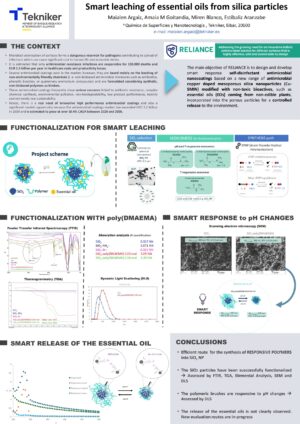
RELIANCE poster presentation at the Materials Week Conference 2024, Limassol, CYPRUS
A poster titled “From chicken feathers to antimicrobial peptides for smart, selfdisinfecting surfaces” presented work package 2 activities taking palce
in RELIANCE project during the Advancing Antimicrobial Nanocoating Technologies Community Day of Materials Week 2024 conference, Cyprus, 17 -21 June 2024. The event involved poster an doral presentations by five Horizon Europe sister projects: NOVA, RELIANCE, STOP, SUSAAN and NANOBLOC.
The poster was developed by RELIANCE partners from HEIA-FR, HES-SO who are deeply involved in the extraction, isolation and purification of Antimicrobial Peptides (AMP) from chicken feathers.
In summary, several extracted AMP mixtures demonstrate antimicrobial activity and are subsequently subjected to further purification to isolate the most active peptide fraction. This multi-step purification process advances the understanding of the activity-structure relationship and allows for the selection of a ustainable scalable process for the production of keratin-based AMPs.
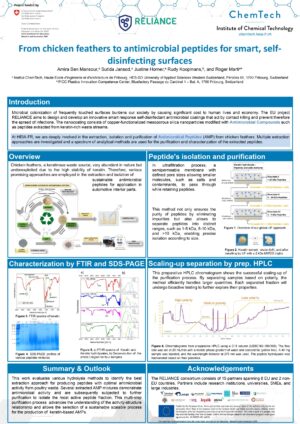
UNITOV and ISBN presenting RELIANCE with two posters at Materials Week Conference 2024, Limassol, CYPRUS
RELIANCE partners from the Defence Institute for Medical Biosciences (ISBN) and University of Rome “Tor Vergata” (UNITOV), Department of Chemical Science and Technologies, Rome, Italy presented the progress of their work with two posters at the Materials Week 2024 (MW24) Conference, Cyprus, 17 -21 June 2024.
The first poster, on “New antimicrobial surfaces based on silica mesoporous nanoparticles functionalized with bioactive compounds”, was displayed during the Advancing Antimicrobial Nanocoating Technologies Community Day co-organized by five Horizon Europe sister projects: NOVA, RELIANCE, STOP, SUSAAN and NANOBLOC.
The second one, entitled “PAPER-BASED ELECTROCHEMICAL SENSOR FOR THE DETECTION OF ESSENTIAL OILS AND SARS-COV-2 VIRUS” was an e-poster and was presented during the official MW24 Conference program by Elisa Recchia, ISBN.
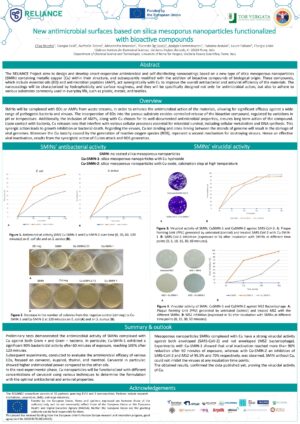
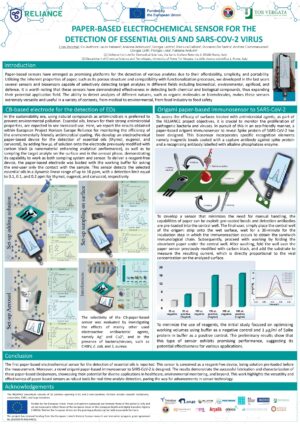
RELIANCE posters presentation at the 5th edition of the International Conference “CBRNE Research and Innovation”, STRASBOURG, FRANCE
Two RELIANCE posters presented the project at the 5th edition of the CBRNE Research and Innovation Conference held in Strasbourg, France from March
19 to 21, 2024.
Download the first poster here. The second one is titled “Paper-based device for monitoring the effectiveness of environmentally friendly antimicrobial coating”, which presents the findings regarding the ability to detect essential oils on the surface using a paper-based device, with the advantage of simplicity, sustainability, and providing broad and promising applications for detection of these compounds.
The posters were developed by our partners from the University of Rome Tor Vergata, Luca Fiore, Arianna Antinucci, Giorgia Leotta, Laura Fabiani, Pierluca Galloni, Riccardo De Santis, Andrea Ciammaruconi, Giorgia Grilli, Elisa Recchia, Florigio Lista, Fabiana Arduini.
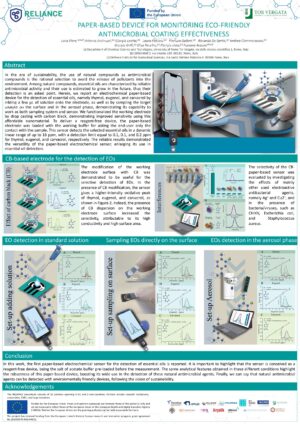
RELIANCE posters presentation at the 5th edition of the International Conference “CBRNE Research and Innovation”, STRASBOURG, FRANCE
Two RELIANCE posters presented the project at the 5th edition of the CBRNE Research and Innovation Conference held in Strasbourg, France from March 19 to 21, 2024.
The first one, titled “Essential Oils as Potential Antimicrobial Agents for Biological Threats: Focus on Thymol-Based Green Disinfectant” displays the progress obtained on the design and development of smart response self-disinfectant antimicrobial nanocoatings based on a new range of smart antimicrobial nanoparticles modified with bio-based bioactive compounds - antimicrobial peptides and essential oils.
The posters were developed by our partners from the University of Rome Tor Vergata, Elisa Recchia, Andrea Ciammaruconi, Nathalie Totaro, Silvia Chimienti, Chiara Pascolini, Riccardo De Santis, Florigio Lista.

RELIANCE poster presentation at the Medical Biodefense Conference 2023, MUNICH, GERMANY
A poster titled “Molecular basis of antimicrobial properties of green nanocoating effective against virus and bacteria” presented RELIANCE project at the 18th edition of the Medical Biodefense Conference organized by the Bundeswehr Institute of Microbiology (IMB) in Munich, Germany from 23-25 October 2023.
The poster was developed by RELIANCE partners from the Defence Institute for Medical Biosciences, and University of Rome “Tor Vergata”, Department of Chemical Science and Technologies, Rome, Italy.
The poster demonstrates the investigation of the molecular mechanisms of E. coli in response to different concentrations of carvacrol (Ca) by studying differentially expressed genes with RNA-seq analysis, highlighting that the findings suggest that carvacrol may affect biological pathways associated with the inhibition of biofilm formation
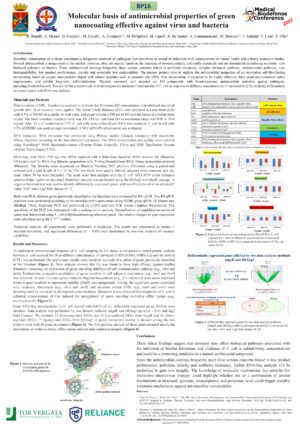
RELIANCE posters presentation at the PLASTICS UPDATE CONFERENCE 2023 – BEYOND BUSINESS AS USUAL, FRIBOURG, SWITZERLAND
Two RELIANCE posters presented the project at the Plastics Update Conference 2023 organized by the Plastics Innovation Competence Center, the Swiss Plastics Cluster, and the Haute école d'ingénierie et d'architecture de Fribourg (HEIA-FR) held in Fribourg, Switzerland on 14 November 2023.
Download the first poster here. The second one is titled “Keratin-based antimicrobial peptides for smart response self-disinfected surfaces – Isolation & Characterization” presents the findings regarding the extraction, isolation, and identification of Antimicrobial Peptides (AMP) from chicken feathers, in which several extraction approaches are particularly investigated and a spectrum of analytical methods are used for the purification and characterization of the extracted peptides. The posters were developed by our partners from HES-SO Haute école spécialisée de Suisse occidentale, Roger Marti, A. Ben Mansour, J. Horner, S. Janson.
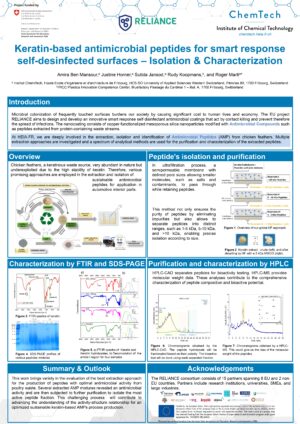
RELIANCE posters presentation at the PLASTICS UPDATE CONFERENCE 2023 – BEYOND BUSINESS AS USUAL, FRIBOURG, SWITZERLAND
Two RELIANCE posters presented the project at the Plastics Update Conference 2023 organized by the Plastics Innovation Competence Center, the Swiss Plastics Cluster, and the Haute école d'ingénierie et d'architecture de Fribourg (HEIA-FR) held in Fribourg, Switzerland on 14 November 2023.
The first one, titled “Bio-based antimicrobial peptides for smart response self-disinfected surfaces” displays the progress obtained in the development of innovative self-disinfected nano-coatings designed with unique antimicrobial nanoparticles, incorporating bioactive elements such as Antimicrobial Peptides (AMPs) sourced from chicken feathers. The posters were developed by our partners from HES-SO Haute école spécialisée de Suisse occidentale, Roger Marti, A. Ben Mansour, J. Horner, S. Janson.
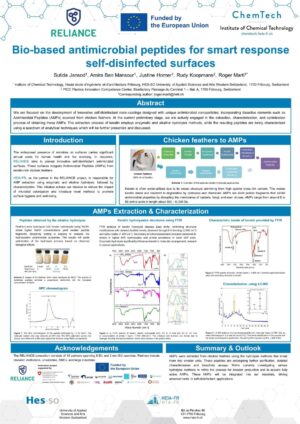
RELIANCE poster presentation at the XXX CONFERENCE OF THE ANALYTICAL CHEMISTRY DIVISION OF THE ITALIAN CHEMICAL SOCIETY (SCI), VASTO, ITALY
A poster titled “A paper-based device for surface essential oils monitoring” presented RELIANCE project at the XXX Conference of the Analytical Chemistry Division of the Italian Chemical Society (SCI), in Vasto, Italy, 17 - 21 September 2023. The poster was developed by our partner from the University of Rome Tor Vergata (UNITOV), Prof. Fabiana Arduini, Luca Fiore & Arianna Antinucci, and displays their progress obtained in developing essential oils by using a novel paper-based electrochemical sensor in a poster presentation.

RELIANCE poster presentation at EUROANALYSIS 2023 CONFERENCE in GENEVA, SWITZERLAND
A poster titled “Bio-based antimicrobial peptides for smart response self-disinfected surfaces” presented RELIANCE project at the Euroanalysis 2023 biannual international conference organized by the Division of Analytical Sciences of the Swiss Chemical Society (DAS) and the University of Geneva in Geneva, Switzerland, 27 – 31 August, 2023. The poster was developed by our partners from the School of Engineering and Architecture of Fribourg (HEIA-FR) Roger Marti, Amira Ben Mansour, Rudy Koopmans, Justin Horner and Sutida Jansod, and displays their progress on investigating the hydrolysis extraction methods of keratin peptides from poultry production waste streams.
RELIANCE poster presentation at the 16th FREIBURGER SYMPOSIUM 2023, FRIBOURG, SWITZERLAND
A poster titled “Bio-based antimicrobial peptides for smart response self-disinfected surfaces” presented RELIANCE project at the 16th edition of the Freiburger Symposium organized by the Swiss Chemical Society, Division of Industrial & Applied Chemistry held in Fribourg, Switzerland from 27-28 April 2023.
The poster was developed by our partners from the School of Engineering and Architecture of Fribourg (HEIA-FR) Roger Marti, Amira Ben Mansour and Justin Horner, who display their progress on deriving keratin peptides from poultry production waste streams. They will be used as antimicrobial compound modifiers of the surface of the copper doped mesopourous silica nanoparticles (Cu-SMIN).
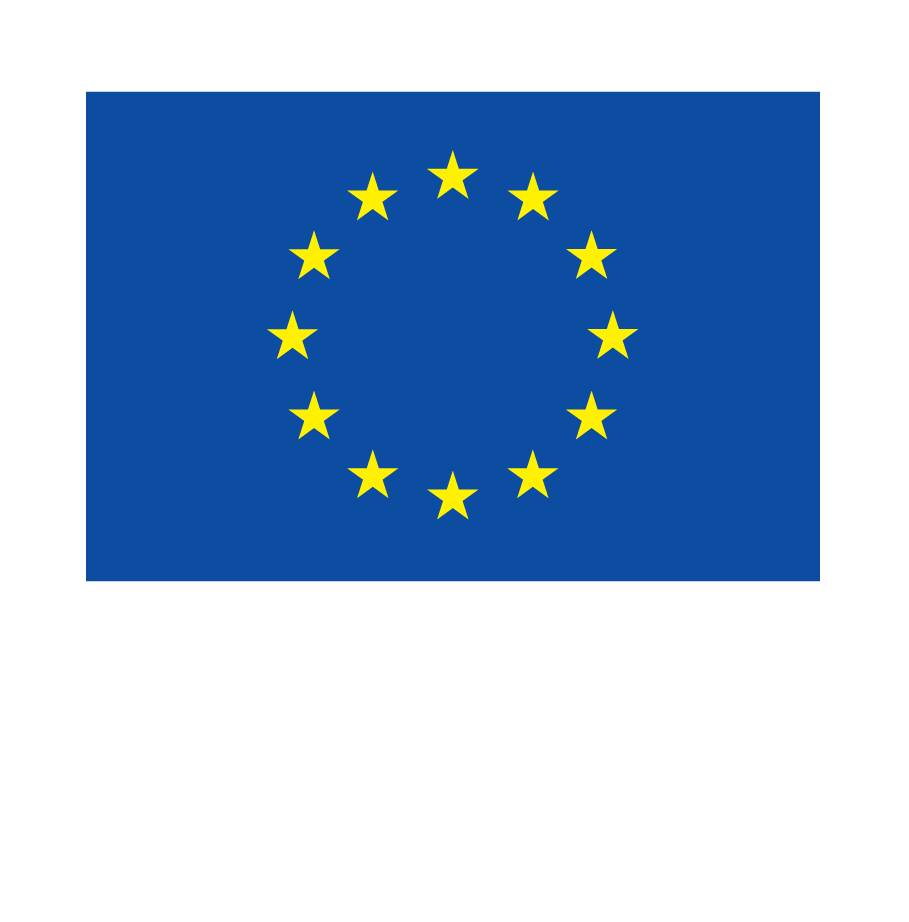
Views and opinions expressed are however those of the author(s) only and do not necessarily reflect those of the European Union or the European Health and Digital Executive Agency (HADEA). Neither the European Union nor the granting authority can be held responsible for them.
© All Rights Reserved 2025 | Reliance-HE
Designed and Developed by Europroject

